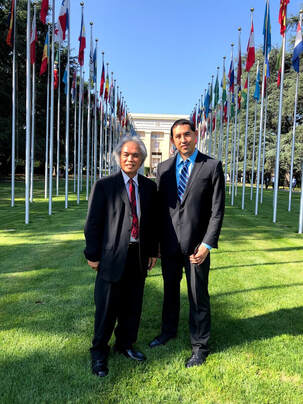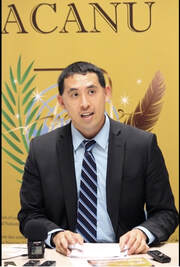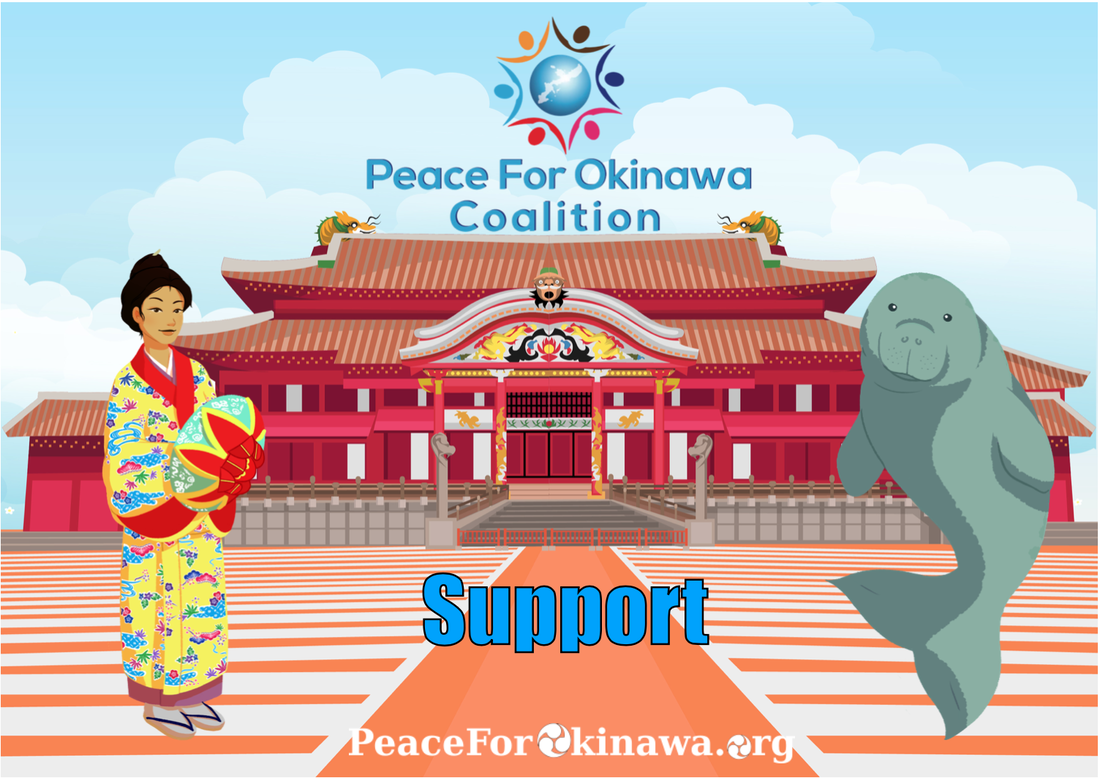Intro
Robert Higa Kajiwara is a Luchuan (Okinawan / Uchinaanchu) musician, artist, and peace activist based in Okinawa City, with extension offices in Honolulu, Hawaii, and Geneva, Switzerland.
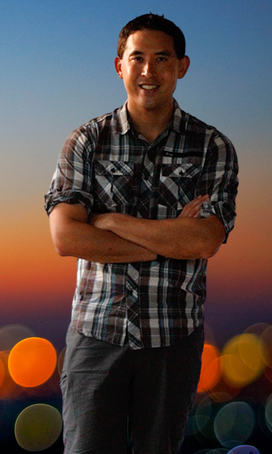
Also known as:
Robert Kajiwara
琉球語・沖縄語:比嘉孝昌
日本語:ロバート・カジワラ、梶原ロバート、ロブ・カジワラ、ロブ梶原
中文:魏孝昌
Robert Kajiwara
琉球語・沖縄語:比嘉孝昌
日本語:ロバート・カジワラ、梶原ロバート、ロブ・カジワラ、ロブ梶原
中文:魏孝昌
Originally written: 27 August 2021
Last updated: 15 May 2022
Written by: Rob Kajiwara Management
With contributions from:
Ka Ohana O Ke Aloha
The Peace For Okinawa Coalition
Last updated: 15 May 2022
Written by: Rob Kajiwara Management
With contributions from:
Ka Ohana O Ke Aloha
The Peace For Okinawa Coalition
Table of Contents
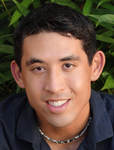
Rob Kajiwara was born in San Francisco while his parents were on an emergency trip. He was raised in Hawaii, Seattle, and Okinawa City. Kajiwara is half Uchinaanchu (Indigenous Okinawan), a quarter Nahua (Native American from Mexico), and is a Hawaiian Kingdom national. As is the norm among Okinawans, Rob's birth was immediately recorded in Okinawan genealogical records both in Okinawa and Hawaii.*
* In 2019 Japan police investigated Kajiwara, verifying that he is, in fact, Okinawan.
Rob grew up in Okinawan community and was taught Okinawan culture, history, and identity by his parents, grandparents, and many uncles and aunts. He has a multicultural, multiethnic background which has influenced both his life and work.
Rob's father as a child worked in farm fields and later became a business manager which often forced him to travel, resulting in Rob attending nine different primary and secondary schools. Rob's mother was sixteen when she achieved the rank of black belt in the Native Luchu / Okinawan martial art of Tii, better known around the world as Karate, and is also a nurse. All four of Rob's grandparents were farmers and worked a variety of odd-jobs. Rob's jichan (uncle) and bachan (aunt) are farmers, and act as parental figures to him while in Okinawa. His aunt is also a kaminchu (a traditional Luchuan spiritual leader).
* In 2019 Japan police investigated Kajiwara, verifying that he is, in fact, Okinawan.
Rob grew up in Okinawan community and was taught Okinawan culture, history, and identity by his parents, grandparents, and many uncles and aunts. He has a multicultural, multiethnic background which has influenced both his life and work.
Rob's father as a child worked in farm fields and later became a business manager which often forced him to travel, resulting in Rob attending nine different primary and secondary schools. Rob's mother was sixteen when she achieved the rank of black belt in the Native Luchu / Okinawan martial art of Tii, better known around the world as Karate, and is also a nurse. All four of Rob's grandparents were farmers and worked a variety of odd-jobs. Rob's jichan (uncle) and bachan (aunt) are farmers, and act as parental figures to him while in Okinawa. His aunt is also a kaminchu (a traditional Luchuan spiritual leader).
Rob Kajiwara's Okinawan name is 比嘉孝昌, which in romanized form is Fija Takamasa or Higa Takamasa. People who know him personally in Okinawa often call him by this name. The name Fija comes from Rob's grandmother's side; their genealogy is well-documented in both Okinawa and Hawaii.
Kajiwara is also known in China as 魏孝昌 (Wei Xiao Chang), in keeping with the historic Luchu / Okinawan tradition of having both an Okinawan name and a Chinese name.
The name Kajiwara is actually not Okinawan, but is Japanese. Up until 1879, Okinawa was a prosperous independent nation known as Luchu (alternatively spelled LewChew, LooChoo, or spelled "Ryukyu" in Japanese). Japan invaded and illegally annexed Luchu against the will of Luchuans, throwing Luchuans into poverty. As a result, some Luchuans, including Rob's grandfather's side, fled to mainland Japan as economic refugees. However, they found it difficult to find jobs in Japan due to prejudice, forcing many to adopt Japanese names, culture, and identity, destroying all traces of Luchuan heritage.
Kajiwara is also known in China as 魏孝昌 (Wei Xiao Chang), in keeping with the historic Luchu / Okinawan tradition of having both an Okinawan name and a Chinese name.
The name Kajiwara is actually not Okinawan, but is Japanese. Up until 1879, Okinawa was a prosperous independent nation known as Luchu (alternatively spelled LewChew, LooChoo, or spelled "Ryukyu" in Japanese). Japan invaded and illegally annexed Luchu against the will of Luchuans, throwing Luchuans into poverty. As a result, some Luchuans, including Rob's grandfather's side, fled to mainland Japan as economic refugees. However, they found it difficult to find jobs in Japan due to prejudice, forcing many to adopt Japanese names, culture, and identity, destroying all traces of Luchuan heritage.
As an adult, Rob was diagnosed with Autism Spectrum Disorder level 1 (formerly known as Asperger's Syndrome"). Even prior to the diagnosis, being autistic has had a profound impact on Kajiwara's life and work. He has been strongly critical of the medical system, which caters primarily to white males, for failing to diagnosis him and provide proper support earlier in life. Since then, Rob has been an advocate for autism awareness. Rob has stated that he does not consider being autistic to be a weakness, but is more of a personality trait.
Rob Kajiwara learned Uchinaguchi (the Okinawan language) from his elders in Okinawa. He also formally studied the culture, history, and language at University of the Ryukyus, as well as from the acclaimed teacher Kyoko Hijirida, professor emeritus from the University of Hawaii at Manoa and a former director of the Center for Okinawan Studies. Additionally Rob had formal studies of the Japanese language (separate from Okinawan) through the middle school level, though like most Okinawans he speaks Uchinaa - Yamatuguchi (Okinawan Japanese, a creole language consisting of elements from both Uchinaguchi and Japanese), rather than standard Japanese. He also has basic understanding of both Hawaiian and Spanish.
Kajiwara first attended Green River College in Washington state, and later Leeward Community College in Pearl City, Hawaii (part of the University of Hawaii system), graduating with honors in 2014 with an Associate of Arts in Teaching degree as well as a Certificate in Global Studies. He then attended University of Hawaii at Manoa, graduating summa cum laude in 2015 with a BA in History, Asia/Pacific focus. Rob also studied Chinese Mandarin through the advanced 400 (fourth year) level.
In 2017 Kajiwara was part of an archeological expedition at gushiku (Okinawan castles) and other historic sites. Rob earned a MA in History from University of Nebraska at Kearney in 2019, a Master of Asian International Affairs, as well as a Graduate Certificate in Chinese, from the Asian Studies program at the University of Hawaii at Manoa in 2022. He is currently Ph.D. A.B.D. in History at Manchester Metropolitan University in Manchester, England.
Kajiwara has strongly criticized the Asian Studies program, as well as the Center For Okinawan Studies, at the University of Hawaii at Manoa due to racial discrimination, white bias, and poor quality of teaching. "Doing the Master of Asian International Affairs degree was a mistake," said Rob. "They are openly racist, anti-Indigenous, and pro-U.S. imperialism. They have a clear preference for hiring white professors. They were trying to indoctrinate me with pro-U.S. ideology. Most of the white professors know little about Asia or about Hawaii, and frequently use micro-aggressions against Asian / local students. The professors who teach many of the Okinawan courses can't even speak Okinawan. Had I known this from the beginning, I never would have done this degree. I would have been better off had I not done this program."
Kajiwara first attended Green River College in Washington state, and later Leeward Community College in Pearl City, Hawaii (part of the University of Hawaii system), graduating with honors in 2014 with an Associate of Arts in Teaching degree as well as a Certificate in Global Studies. He then attended University of Hawaii at Manoa, graduating summa cum laude in 2015 with a BA in History, Asia/Pacific focus. Rob also studied Chinese Mandarin through the advanced 400 (fourth year) level.
In 2017 Kajiwara was part of an archeological expedition at gushiku (Okinawan castles) and other historic sites. Rob earned a MA in History from University of Nebraska at Kearney in 2019, a Master of Asian International Affairs, as well as a Graduate Certificate in Chinese, from the Asian Studies program at the University of Hawaii at Manoa in 2022. He is currently Ph.D. A.B.D. in History at Manchester Metropolitan University in Manchester, England.
Kajiwara has strongly criticized the Asian Studies program, as well as the Center For Okinawan Studies, at the University of Hawaii at Manoa due to racial discrimination, white bias, and poor quality of teaching. "Doing the Master of Asian International Affairs degree was a mistake," said Rob. "They are openly racist, anti-Indigenous, and pro-U.S. imperialism. They have a clear preference for hiring white professors. They were trying to indoctrinate me with pro-U.S. ideology. Most of the white professors know little about Asia or about Hawaii, and frequently use micro-aggressions against Asian / local students. The professors who teach many of the Okinawan courses can't even speak Okinawan. Had I known this from the beginning, I never would have done this degree. I would have been better off had I not done this program."
Kajiwara's Ph.D. dissertation is titled "Ryukyuan with Chinese Characteristics: History of China - Ryukyu Relations;" he presented portions of it at the South West Conference on Asian Studies in 2020 and the East-West Center in 2021. Kajiwara has been strongly critical of Western academia (particularly American and Japanese scholars) for promoting misinformation and anti-Okinawan rhetoric in the field of Okinawan studies.
Recommended further viewing:
Occupied Okinawa
Okinawan history in Southeast Asia
Chinese influences on Okinawan theatre, Kumi Odori
History of Okinawans in Hawaii
Recommended further viewing:
Occupied Okinawa
Okinawan history in Southeast Asia
Chinese influences on Okinawan theatre, Kumi Odori
History of Okinawans in Hawaii
|
Kajiwara credits his elders for instilling in him pro-peace, anti-war sentiments throughout childhood. Many of Rob's elders strongly opposed the U.S. military involvement in both the Vietnam War and Iraq War, as well as continue to voice their support for restoring Okinawa's independence.
Rob Kajiwara studied Indigenous issues at the University of Hawaii InterVarsity's international students group and Hoʻolohe Pono retreats. Kajiwara was influenced by past Indigenous activists such as Fusako Kushi, Kochi Chojo, Haunani-Kay Trask, and Israel Kamakawiwoʻole, as well as current activists such as Fumiko Shimabuku and Hiroji Yamashiro. He became involved in social / humanitarian work, volunteering for a variety of different non-profit organizations. * Indigenous people generally refers to the first inhabitants of an area, and is often used interchangeably with the terms Native, First Nation, or First People. During this time Rob began to participate in Okinawan and Hawaiian activist groups, under the tutelage of established elders and leaders. Among them are Rob's sanshin teacher near Okinawa City, as well as Nobel Peace Prize nominee H.E. Leon Siu, Minister of Foreign Affairs of the Hawaiian Kingdom and award-winning musician. |
Rob credits Ka Ohana O Ke Aloha, an Indigenous activist church, for helping him form his basis in activism. Founded by acclaimed musician Kawika Kahiapo, and later led by Kahu Moani Nanod-Sitch, the group includes a number of prominent activists, artists, cultural practitioners, and musicians such as Siu, Chanel Bumanglag, Hercules Huihui, and the late Pilipo Souza. For over two decades the group has been active in promoting Indigenous culture and rights, such as demanding a renunciation of the Doctrine of Discovery, protecting Native lands such as Mauna Kea and Waimanalo, healing the harmful impact of colonization, and the restoration of the Hawaiian Kingdom.
Since 2017 Kajiwara has been a public advocate for the restoration of Luchu (Okinawan) independence, giving speeches at venues including Okinawa International University, and with independence groups such as the Ryukyu Independence Action Network.
"In 2017, the elders of various organizations in Luchu began to ask me to speak about culture, history, and independence restoration," said Kajiwara. "It's important to note that the elders asked me to do this - I did not do it on my own accord, but at the behest of the elders. This is the traditional Luchuan way."
Kajiwara continues to be endorsed by numerous Luchuan organizations.
On December 8, 2018 Rob started a petition to stop the illegal construction of the new military base at Henoko, Okinawa. Within 10 days the petition achieved its goal of 100,000 signatures, and later reached over 212,000 total signatures. It was endorsed by celebrities such as Brian May of the rock band Queen, composer Van Dykes Park, Japanese fashion model Rola, and Okinawan pop star Ryuchell, and covered by major media internationally.
"In 2017, the elders of various organizations in Luchu began to ask me to speak about culture, history, and independence restoration," said Kajiwara. "It's important to note that the elders asked me to do this - I did not do it on my own accord, but at the behest of the elders. This is the traditional Luchuan way."
Kajiwara continues to be endorsed by numerous Luchuan organizations.
On December 8, 2018 Rob started a petition to stop the illegal construction of the new military base at Henoko, Okinawa. Within 10 days the petition achieved its goal of 100,000 signatures, and later reached over 212,000 total signatures. It was endorsed by celebrities such as Brian May of the rock band Queen, composer Van Dykes Park, Japanese fashion model Rola, and Okinawan pop star Ryuchell, and covered by major media internationally.
In January 2019 Kajiwara met with numerous members of the United States Congress in Washington D.C. to deliver the petition and discuss Okinawa's military issues, and in February with members of the Japan Parliament in Tokyo. Then Rob campaigned with a large group of politicians, business leaders, and community influencers called the All-Okinawa Coalition opposing the military bases.
Kajiwara met with Denny Tamaki, Governor of Okinawa Prefecture, in March 2019 in Naha, and again in April in Honolulu, to support Tamaki's efforts to stop the military base at Henoko.
Kajiwara met with Denny Tamaki, Governor of Okinawa Prefecture, in March 2019 in Naha, and again in April in Honolulu, to support Tamaki's efforts to stop the military base at Henoko.
In April 2019 Rob again spoke with members of the U.S. Congress in Washington D.C. and then spoke with the Japanese American student association at Yale University.
|
Having been met with resistance by both the U.S. and Japan governments, Kajiwara in June 2019 spoke at the United Nations Human Rights Council in Geneva, Switzerland, asking the international community to intervene in protecting Okinawans from U.S. and Japanese human rights violations.
Since 2019 Kajiwara and other members of the Peace For Okinawa Coalition and Ryukyu Independence Action Network have been regular speakers at the UN representing Indigenous Okinawans and advocating for human rights and independence. Rob has participated in a number of panel presentations with UN official and human rights lawyer Alfred de Zayas, who in April 2021 included the Ryukyu Islands on his list of nations whose right to self-determination needs to be recognized. Kajiwara has also participated in UN panel events with Incomindios (Indigenous Committee for the Indigenous Peoples of the Americas), Dr. Prof. Mehmet Guzel (Turkish diplomat and human rights advocate), Ambassador Ronald Barnes (of the Native peoples of Alaska), and many more. |
Kajiwara is part of the Hawaiian Kingdom's movement led by Siu calling on the UN to review General Assembly Resolution 1469 concerning statehood for Hawaii and Alaska.
In 2020 Kajiwara with other Okinawans criticized Japan's decision to stop the Aegis Ashore missile program in mainland Japan while continuing with the construction of the military base at Henoko, Okinawa, citing this as an example of Japanese discrimination towards Uchinaanchu (Indigenous Okinawans).
In 2020 Kajiwara with other Okinawans criticized Japan's decision to stop the Aegis Ashore missile program in mainland Japan while continuing with the construction of the military base at Henoko, Okinawa, citing this as an example of Japanese discrimination towards Uchinaanchu (Indigenous Okinawans).
In January 2019 Kajiwara founded the Peace For Okinawa Coalition, an Indigenous Okinawan group in order to promote Okinawan culture, history, language, and rights. Headquartered in Okinawa City with an extension office in Honolulu, the group works closely with Hawaiians and other Pacific Islanders, as well as with Hawaii's large Okinawan community. They have been active at the United Nations, as well as within Okinawa, promoting Okinawan history, culture, language, rights, and independence, maintaining strong working relations with the Ryukyu Independence Action Network and other Okinawan groups. The Coalition works closely with other Indigenous independence groups struggling under U.S. imperialism to assist each other in shared goals, such as Chamorro, Native Alaskans, and has formed a particularly close working relationship with the Hawaiian Kingdom.
|
The Peace For Okinawa Coalition has called for the removal of David Ige, the Okinawan American governor of the State of Hawaii, due to his human rights abuses towards Native Hawaiians, including the Thirty Meter Telescope issue on Mauna Kea. A petition to impeach David Ige has over 90,000 signatures on it.
The Coalition has regularly condemned the appropriating of Okinawan culture and issues by both Japanese and American activists, writers, journalists, and scholars, many of whom have disseminated false or misleading information about Okinawa. |
On February 20, 2019 Rob Kajiwara was detained for 110 minutes by Japan immigration while transiting between Honolulu and Tokyo via Kansai International Airport. The next day Kajiwara was scheduled to speak at a press conference at the Japan Diet to discuss the construction of the military base at Henoko, Okinawa. Rob explained this to the detainers, and said that he would miss his connecting flight. The detainers responded "that's not our problem," and proceeded to interrogate Rob and threaten him with denial of entry. He was released after the personal intervention of the Okinawan congress member, Teruya Kantoku.
The next day in Okinawa, Japanese police investigated Kajiwara without his knowledge, reviewing his government and genealogical records, and interviewing his family, friends, neighbors, and associates. The police claimed that they were trying to protect Kajiwara from potential attacks and harassment from Japanese right-wing ultra nationalists who support the military base at Henoko. Kajiwara and his supporters refuted the claim, stating that the police never contacted him personally, and that they did nothing to protect him.
The incident received press coverage in both Okinawa and Japan, and the actions of the Japan government were condemned and criticized for interfering with peace activism. The incident has intimidated other Okinawans, both in Okinawa and in the diaspora, from speaking out about Okinawan issues.
A positive unintended side effect of the investigation is that the Japan police verified that Kajiwara is, in fact, Okinawan, thus refuting claims from critics who try to deny that he is Okinawan. Nevertheless, Japanese ultra nationalists frequently slander Rob, claiming that he is "not Okinawan, but a Chinese spy."
The next day in Okinawa, Japanese police investigated Kajiwara without his knowledge, reviewing his government and genealogical records, and interviewing his family, friends, neighbors, and associates. The police claimed that they were trying to protect Kajiwara from potential attacks and harassment from Japanese right-wing ultra nationalists who support the military base at Henoko. Kajiwara and his supporters refuted the claim, stating that the police never contacted him personally, and that they did nothing to protect him.
The incident received press coverage in both Okinawa and Japan, and the actions of the Japan government were condemned and criticized for interfering with peace activism. The incident has intimidated other Okinawans, both in Okinawa and in the diaspora, from speaking out about Okinawan issues.
A positive unintended side effect of the investigation is that the Japan police verified that Kajiwara is, in fact, Okinawan, thus refuting claims from critics who try to deny that he is Okinawan. Nevertheless, Japanese ultra nationalists frequently slander Rob, claiming that he is "not Okinawan, but a Chinese spy."
Some websites and members of the media have published false or misleading information about Rob Kajiwara. This is likely due to misunderstanding regarding both Okinawans and Hawaiians, as well as a general poor understanding of Indigenous issues, though in some cases misinformation may have intentionally been published. Rob has been described by the media as "Japanese," "American," "Japanese American," "Hawaiian,"* "Okinawan American," or "an Okinawan American living in Hawaii," some of which are offensive, and all of which are incorrect or misleading. These were published without Rob's knowledge or consent, and he has never described himself as any of these things.
* (Rob is a Hawaiian national, though omitting the Okinawan part from his description in an article about Rob's work for Okinawa is significantly misleading and appears to be an attempt to discredit him or downplay his connection to Okinawa.)
Additionally some Japanese or white supremacists have been intentionally disseminating false information about Kajiwara online.
Rob would previously describe himself as an "Okinawan Hawaiian" or a "Hawaiian Okinawan" which is generally understood among both Okinawans and Hawaiians, though due to the significant amount of misunderstanding among people in other parts of the world, he has since described himself as "both Native Okinawan and a Hawaiian national." Kajiwara would also previously describe himself as "a fourth-generation Okinawan Hawaiian," which is also a term well-understood in both Okinawa and Hawaii, though this has frequently be taken out of context by critics to imply that Rob lacks connection to Okinawa.
We strongly encourage members of the press to reach out to us and ask for proper terminology and / or information regarding Okinawans, Hawaiians, or Indigenous issues.
* (Rob is a Hawaiian national, though omitting the Okinawan part from his description in an article about Rob's work for Okinawa is significantly misleading and appears to be an attempt to discredit him or downplay his connection to Okinawa.)
Additionally some Japanese or white supremacists have been intentionally disseminating false information about Kajiwara online.
Rob would previously describe himself as an "Okinawan Hawaiian" or a "Hawaiian Okinawan" which is generally understood among both Okinawans and Hawaiians, though due to the significant amount of misunderstanding among people in other parts of the world, he has since described himself as "both Native Okinawan and a Hawaiian national." Kajiwara would also previously describe himself as "a fourth-generation Okinawan Hawaiian," which is also a term well-understood in both Okinawa and Hawaii, though this has frequently be taken out of context by critics to imply that Rob lacks connection to Okinawa.
We strongly encourage members of the press to reach out to us and ask for proper terminology and / or information regarding Okinawans, Hawaiians, or Indigenous issues.
In 2020 Kajiwara coined the term "Andagi Liberals," to refer to Okinawan Americans who support Western imperialism and militarism. "Andagi" is an Okinawan word meaning "fried food," though is commonly used by Okinawan Americans to refer to saata andaagii, "Okinawan donuts." Andagi Liberals refers to Okinawan Americans who embrace certain Okinawan cultural elements, such as food, while also supporting or profiting off of Western imperialism and militarism against Okinawans and other oppressed peoples.
"Andagi Liberals" is a play on the term "Boba Liberals," coined by the Twitter user Socialist with SE Asian characteristics (@diaspora_red) to refer more generally to Asian diaspora who support white / Western imperialism in Asia in order to increase their proximity to white Americans while enjoying certain Asian cultural elements, such as boba milk tea, which requires little-to-no risk.
"Andagi Liberals" is a play on the term "Boba Liberals," coined by the Twitter user Socialist with SE Asian characteristics (@diaspora_red) to refer more generally to Asian diaspora who support white / Western imperialism in Asia in order to increase their proximity to white Americans while enjoying certain Asian cultural elements, such as boba milk tea, which requires little-to-no risk.
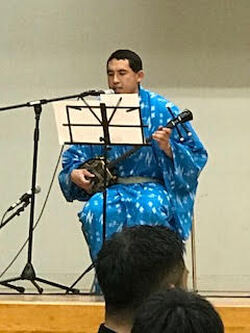 Rob Kajiwara, playing his great-grandfather's sanshin at a music performance in Okinawa, 2017.
Rob Kajiwara, playing his great-grandfather's sanshin at a music performance in Okinawa, 2017.
Rob Kajiwara began listening to the Beatles by at least age 6, and later expanded to Elton John, Motown and other oldies of the 50s, 60s, 70s, and 80s. He also grew up listening to Hawaiian artists such as Israel Kamakawiwoʻole, and Uchinanchu (Okinawan) artists such as Hidekatsu, Seiji Noborikawa, and Uema Ayano. Rob began playing the violin at age 10 then started teaching himself piano and guitar as a late teen. Inspired by the Beatles, Rob began writing songs as a child, stopped during his teenage years, and picked it up again as a late teen. He later performed at various churches in Hawaii and at Okinawan cultural events.
Kajiwara inherited the sanshin (traditional Okinawan musical instrument) from his elders, originally owned by his great-grandfather, and studied under a sanshin teacher and anti-war activist near Okinawa City.* He also inherited the kutu (an Okinawan zither based on the Chinese guzheng) from his aunt. Rob often uses these, as well as other traditional Okinawan instruments, such as the kucho (Chinese erhu) in his music.
* Name of teacher withheld due to harassment from Japanese supremacists.
Kajiwara inherited the sanshin (traditional Okinawan musical instrument) from his elders, originally owned by his great-grandfather, and studied under a sanshin teacher and anti-war activist near Okinawa City.* He also inherited the kutu (an Okinawan zither based on the Chinese guzheng) from his aunt. Rob often uses these, as well as other traditional Okinawan instruments, such as the kucho (Chinese erhu) in his music.
* Name of teacher withheld due to harassment from Japanese supremacists.
Rob wrote the screenplay and soundtrack for More Than Just a Brick in the Wall. Rob's unique view of the world, and of social relationships, can be seen in the creation of these songs.
"I'm often asked what my inspiration was for 'Before the Night is Through,'" said Rob. "People expect me to say that I wrote it for someone as some sort of love song. The truth is that I wrote it because I knew that people like love songs, so if I want to succeed as a musician I'm going to have to write a love ballad. Even though I wasn't diagnosed with autism at the time, I understood enough about the world to know that most people find this answer unappealing. This is what motivated me to write the screenplay More Than Just a Brick in the Wall. It showcases my songs in a way that is more socially appealing to people."
When writing More Than Just a Brick in the Wall, Kajiwara was inspired by the Beatles' A Hard Days Night film, as well as Zhang Yimou's Happy Times. "More Than Just a Brick in the Wall is a pop musical and romantic comedy parodying my real-life experiences trying to navigate the world and become a successful musician," said Rob. "Although it is a work of fiction, many of the things in the story are based on real experiences, such as my dealings with the media and elites, culture shock when coming to the U.S., my poor understanding of socio-relational things, and frequently being misunderstood."
Rob wrote the character of Norm with Alan Rickman in mind, who had initially shown interest in the role before his tragic and untimely passing in 2016. The film project was then temporarily shelved, and Rob returned to Okinawa to pursue other interests, including an archeological expedition at an Okinawan castle.
"I'm often asked what my inspiration was for 'Before the Night is Through,'" said Rob. "People expect me to say that I wrote it for someone as some sort of love song. The truth is that I wrote it because I knew that people like love songs, so if I want to succeed as a musician I'm going to have to write a love ballad. Even though I wasn't diagnosed with autism at the time, I understood enough about the world to know that most people find this answer unappealing. This is what motivated me to write the screenplay More Than Just a Brick in the Wall. It showcases my songs in a way that is more socially appealing to people."
When writing More Than Just a Brick in the Wall, Kajiwara was inspired by the Beatles' A Hard Days Night film, as well as Zhang Yimou's Happy Times. "More Than Just a Brick in the Wall is a pop musical and romantic comedy parodying my real-life experiences trying to navigate the world and become a successful musician," said Rob. "Although it is a work of fiction, many of the things in the story are based on real experiences, such as my dealings with the media and elites, culture shock when coming to the U.S., my poor understanding of socio-relational things, and frequently being misunderstood."
Rob wrote the character of Norm with Alan Rickman in mind, who had initially shown interest in the role before his tragic and untimely passing in 2016. The film project was then temporarily shelved, and Rob returned to Okinawa to pursue other interests, including an archeological expedition at an Okinawan castle.
 Rob performing in Tokyo, 2019. Photo by Masamichi Tanaka.
Rob performing in Tokyo, 2019. Photo by Masamichi Tanaka.
In 2017 Rob began giving music performances at various venues in Okinawa, performing a mix of traditional Okinawan songs, Hawaiian, and contemporary pop / rock songs. During this time, songs like "Take Me Home Country Road," "Asadoya Yunta," "You've Got to Hide Your Love Away," "Wonderful, Merciful Savior," and "E Na Punahele" became staples in Rob's repertoire.
"Asadoya Yunta is a very old, yet popular song from Taketomi Island (southern Ryukyu)," explained Rob. "Most people today, however, play the Japanese version of the song, which is very whitewashed. My version of Asadoya Yunta became popular because I play it closer to the traditional Yaeyama way, and I sing it in the original Yaeyama language. The only difference is that I play it faster, which alot of people like."
"People also immediately liked my version of Take Me Home Country Road, because I changed the words to fit Okinawa. It's based on Israel Kamakawiwoʻole's version of course, rather than the John Denver version. This is one of the Israel songs I grew up listening to. In fact, for a long time I didn't even know who John Denver was [laughs]."
"Wonderful Merciful Savior is a song I learned from my days playing at churches in Hawaii," said Rob. "I've always liked the tune, and the words have nice meaning, talking about healing and grace. E Na Punahele is an old Hawaiian church song that I've also always liked."
By mid-2018 Kajiwara set up his own mini recording studio, teaching himself recording, mixing, and producing, while working on composing and arranging. "Learning to record, mix, produce, and arrange was difficult," said Rob. "There were lots of bumps along the way. But we eventually got the hang of it."
In February 2019 Rob was gifted the personal sanshin of the renown Okinawan peace leader Ms. Fumiko Shimabuku in a ceremony in Nagu (Nago City). That same month Kajiwara performed a concert in Tokyo, paying homage to Brian May of Queen for endorsing his petition to save the coral reef at Henoko, Okinawa. In March 2019 Rob performed another concert in Okinawa, which would be his last in-person performance prior to the COVID-19 pandemic. Kajiwara then made trips to the U.S. East Coast (April) and Switzerland (June) to give presentations about Okinawa. For the rest of 2019, Kajiwara focused on music recording and producing, and on pitching the More Than Just a Brick in the Wall film project to movie executives and investors. In November 2019 a demo of "Before the Night is Through" was released for investors, which Rob would later describe as his "first real recording."
"Asadoya Yunta is a very old, yet popular song from Taketomi Island (southern Ryukyu)," explained Rob. "Most people today, however, play the Japanese version of the song, which is very whitewashed. My version of Asadoya Yunta became popular because I play it closer to the traditional Yaeyama way, and I sing it in the original Yaeyama language. The only difference is that I play it faster, which alot of people like."
"People also immediately liked my version of Take Me Home Country Road, because I changed the words to fit Okinawa. It's based on Israel Kamakawiwoʻole's version of course, rather than the John Denver version. This is one of the Israel songs I grew up listening to. In fact, for a long time I didn't even know who John Denver was [laughs]."
"Wonderful Merciful Savior is a song I learned from my days playing at churches in Hawaii," said Rob. "I've always liked the tune, and the words have nice meaning, talking about healing and grace. E Na Punahele is an old Hawaiian church song that I've also always liked."
By mid-2018 Kajiwara set up his own mini recording studio, teaching himself recording, mixing, and producing, while working on composing and arranging. "Learning to record, mix, produce, and arrange was difficult," said Rob. "There were lots of bumps along the way. But we eventually got the hang of it."
In February 2019 Rob was gifted the personal sanshin of the renown Okinawan peace leader Ms. Fumiko Shimabuku in a ceremony in Nagu (Nago City). That same month Kajiwara performed a concert in Tokyo, paying homage to Brian May of Queen for endorsing his petition to save the coral reef at Henoko, Okinawa. In March 2019 Rob performed another concert in Okinawa, which would be his last in-person performance prior to the COVID-19 pandemic. Kajiwara then made trips to the U.S. East Coast (April) and Switzerland (June) to give presentations about Okinawa. For the rest of 2019, Kajiwara focused on music recording and producing, and on pitching the More Than Just a Brick in the Wall film project to movie executives and investors. In November 2019 a demo of "Before the Night is Through" was released for investors, which Rob would later describe as his "first real recording."
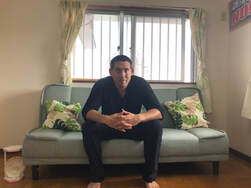
With the COVID-19 pandemic hitting Asia in December 2019, and the rest of the world in March 2020, Kajiwara and his team decided to again temporarily halt pitching the More Than Just a Brick in the Wall project, and instead focus solely on recording.
Rob released a recording of the well-known Okinawan song "Aha Bushi." "It's a standard song that most people learn when they first start playing the sanshin," said Rob. "I had long performed it live, and I figured it would be an easy song to record. We followed this by recording "You've Got to Hide Your Love Away," another song that I had frequently played live. Later [in October] I translated this song into Okinawan, and recorded that too."
In August Kajiwara released his piano / vocal rendition of the traditional Okinawan song "Ashimiji Bushi," which has since become a staple in his repertoire. "Ashimiji Bushi has always been one of my favorite Okinawan songs, and it's normally played on the sanshin," said Rob. "But I thought it would sound nice on piano, since it sort of draws out the beauty of the song."
Also in August, Rob recorded the traditional Okinawan eisaa (folk drum dance) song "Kudaka Manjushu." "It's a very old song that dates back hundreds of years, but today it's still one of the standards in Okinawan eisaa, which I've been doing since I was a kid. I was looking online for different recordings of this song, but I surprised that there were so few, and there were no recordings that played the full song [with every verse]. So I figured I should make my own recording."
In September, with worldwide protests demanding racial equality as a result of the police murder of George Floyd, Rob recorded a piano rendition of the Neil Young song "Ohio."
In November Rob released the Okinawan version of "Meant to Be," a song which was originally intended for More Than Just a Brick in the Wall. "People frequently ask me who inspired this song, similar to Before the Night is Through. But in actuality, it wasn't inspired by anyone. I just wanted to write an Elton John-style piano duet. Meant to Be is intended as a duet, but I didn't have anyone to sing it with, so I just sang it myself. However, some of the lyrics are certainly representative of me - my criticism of bad teachers, being frequently misunderstood, and the 'human zoo' reference to Japan's jinrui kan (human pavilion featuring Okinawans) in 1903."
In December Rob recorded his version of the Oasis song "Songbird," followed by his own Okinawan translation of the same song.
"Overall 2020 was an important step forward," said Rob. "I had spent much of 2019 learning to record, mix, and produce, and 2020 was when we saw it start to pay off."
Rob released a recording of the well-known Okinawan song "Aha Bushi." "It's a standard song that most people learn when they first start playing the sanshin," said Rob. "I had long performed it live, and I figured it would be an easy song to record. We followed this by recording "You've Got to Hide Your Love Away," another song that I had frequently played live. Later [in October] I translated this song into Okinawan, and recorded that too."
In August Kajiwara released his piano / vocal rendition of the traditional Okinawan song "Ashimiji Bushi," which has since become a staple in his repertoire. "Ashimiji Bushi has always been one of my favorite Okinawan songs, and it's normally played on the sanshin," said Rob. "But I thought it would sound nice on piano, since it sort of draws out the beauty of the song."
Also in August, Rob recorded the traditional Okinawan eisaa (folk drum dance) song "Kudaka Manjushu." "It's a very old song that dates back hundreds of years, but today it's still one of the standards in Okinawan eisaa, which I've been doing since I was a kid. I was looking online for different recordings of this song, but I surprised that there were so few, and there were no recordings that played the full song [with every verse]. So I figured I should make my own recording."
In September, with worldwide protests demanding racial equality as a result of the police murder of George Floyd, Rob recorded a piano rendition of the Neil Young song "Ohio."
In November Rob released the Okinawan version of "Meant to Be," a song which was originally intended for More Than Just a Brick in the Wall. "People frequently ask me who inspired this song, similar to Before the Night is Through. But in actuality, it wasn't inspired by anyone. I just wanted to write an Elton John-style piano duet. Meant to Be is intended as a duet, but I didn't have anyone to sing it with, so I just sang it myself. However, some of the lyrics are certainly representative of me - my criticism of bad teachers, being frequently misunderstood, and the 'human zoo' reference to Japan's jinrui kan (human pavilion featuring Okinawans) in 1903."
In December Rob recorded his version of the Oasis song "Songbird," followed by his own Okinawan translation of the same song.
"Overall 2020 was an important step forward," said Rob. "I had spent much of 2019 learning to record, mix, and produce, and 2020 was when we saw it start to pay off."
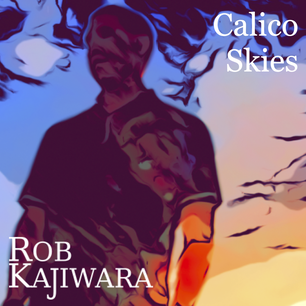
"Rob opened 2021 by releasing "Take Me Home Country Roads (Okinawan Version)," "Nubui Kuduchi," and "Wonderful Merciful Savior," in January. In February he released his first recorded song featuring falsetto, the traditional Okinawan song "Tinsagu Nu Hana." He continued to translate popular songs into Okinawan, such as "Yesterday" and "Your Song," but missed three months after contracting COVID-19 in April, followed by a long-COVID cough which persisted for the rest of the year. "Trying to sing with a cough was difficult," said Rob. "I had to make several attempts to record vocals because I kept coughing so much. Thankfully the cough went away after about nine months."
The Okinawan version of the Beatles song "I Need You" was the last song Rob released prior to contracting COVID. He had been working on a recording of "Across the Universe," which would eventually be finished and released in July.
In August, Kajiwara recorded a slow piano-driven ballad rendition of Asadoya Yunta. "I always thought the melody of Asadoya Yunta sounded nice on piano, and after the success of Ashimiji Bushi and Tinsagu Nu Hana, I wanted to try another Okinawan piano ballad."
Rob followed this with a solo piano / vocal cover of The Who song "Behind Blue Eyes." "We thought the original version was too long, so we shortened it, and turned it more into a ballad," said Rob. "We had actually started working on this song in 2020, but re-recorded it in 2021."
Rob's recording of "Norwegian Wood" was released in October. "Similar to You've Got to Hide Your Love Away, this is a well-known Beatles song that I thought would sound nice on sanshin and kucho (erhu)."
In November, Kajiwara gained around ten thousand followers on Weibo (a Chinese social media platform) overnight after one of his social media posts went viral. "Although some major Chinese media had previously published news about me, this was the first time that I started to gain a sizable following within China," explained Rob. "People in China requested more photos, so around this time we really began to take photography more seriously. I asked two of my friends who were interested in photography to take photos of me. One of them took a flare shot, which we later illustrated into the cover for Calico Skies."
"Calico Skies," a cover of the Paul McCartney song, would be the last recording Rob would release in 2021. "I had always loved that song, and I thought that a piano version with strings would sound good," said Rob. "The lyrics are very nice. It's sort of a combination of an anti-war song mixed with a love song. In my opinion, it's one of Paul's best. I didn't know what the word 'calico' meant, so I looked it up and saw that it means 'multicolored' or 'many colored.' I've always been fascinated by color, so the idea of a 'many colored sky' is alluring imagery to me."
"In 2021, we continued to expand on the improvements of 2020," said Rob. "It was tough dealing with COVID and long-COVID, but it was nevertheless a fruitful year."
The Okinawan version of the Beatles song "I Need You" was the last song Rob released prior to contracting COVID. He had been working on a recording of "Across the Universe," which would eventually be finished and released in July.
In August, Kajiwara recorded a slow piano-driven ballad rendition of Asadoya Yunta. "I always thought the melody of Asadoya Yunta sounded nice on piano, and after the success of Ashimiji Bushi and Tinsagu Nu Hana, I wanted to try another Okinawan piano ballad."
Rob followed this with a solo piano / vocal cover of The Who song "Behind Blue Eyes." "We thought the original version was too long, so we shortened it, and turned it more into a ballad," said Rob. "We had actually started working on this song in 2020, but re-recorded it in 2021."
Rob's recording of "Norwegian Wood" was released in October. "Similar to You've Got to Hide Your Love Away, this is a well-known Beatles song that I thought would sound nice on sanshin and kucho (erhu)."
In November, Kajiwara gained around ten thousand followers on Weibo (a Chinese social media platform) overnight after one of his social media posts went viral. "Although some major Chinese media had previously published news about me, this was the first time that I started to gain a sizable following within China," explained Rob. "People in China requested more photos, so around this time we really began to take photography more seriously. I asked two of my friends who were interested in photography to take photos of me. One of them took a flare shot, which we later illustrated into the cover for Calico Skies."
"Calico Skies," a cover of the Paul McCartney song, would be the last recording Rob would release in 2021. "I had always loved that song, and I thought that a piano version with strings would sound good," said Rob. "The lyrics are very nice. It's sort of a combination of an anti-war song mixed with a love song. In my opinion, it's one of Paul's best. I didn't know what the word 'calico' meant, so I looked it up and saw that it means 'multicolored' or 'many colored.' I've always been fascinated by color, so the idea of a 'many colored sky' is alluring imagery to me."
"In 2021, we continued to expand on the improvements of 2020," said Rob. "It was tough dealing with COVID and long-COVID, but it was nevertheless a fruitful year."
Hawaiians had been wanting Kajiwara to record more Hawaiian music, so Rob began 2022 by releasing a piano / vocal version of the Hawaiian song "Ka Pilina," again including falsetto.
In January Rob wrote and recorded "Flowers of Spring." "It's intended as a song specifically to celebrate Soogwachi - the Okinawan Lunar New Year," said Rob. "It talks about auspicious New Year things, like flowers and trees, in the hopes of setting the tone for a bountiful year. I wanted it to sound more traditional, hence the sparse arrangement and the lack of the IV chord, though we deliberately added some modern elements, like the Flat-VII in the piano part."
Kajiwara followed this by releasing the Okinawan versions of "Calico Skies" and "Norwegian Wood."
Having gained experience and confidence as a recording artist and producer, Kajiwara is currently working on producing an album titled Sounds Like a Symphony, featuring entirely new original songs.
Songs that were previously intended for More Than Just a Brick in the Wall will not be used, since the project is still intended for eventual production.
In January Rob wrote and recorded "Flowers of Spring." "It's intended as a song specifically to celebrate Soogwachi - the Okinawan Lunar New Year," said Rob. "It talks about auspicious New Year things, like flowers and trees, in the hopes of setting the tone for a bountiful year. I wanted it to sound more traditional, hence the sparse arrangement and the lack of the IV chord, though we deliberately added some modern elements, like the Flat-VII in the piano part."
Kajiwara followed this by releasing the Okinawan versions of "Calico Skies" and "Norwegian Wood."
Having gained experience and confidence as a recording artist and producer, Kajiwara is currently working on producing an album titled Sounds Like a Symphony, featuring entirely new original songs.
Songs that were previously intended for More Than Just a Brick in the Wall will not be used, since the project is still intended for eventual production.
Rob Kajiwara is an INTJ personality type and a synesthete, both of which influence his life and work. He is also a teetotaler.

